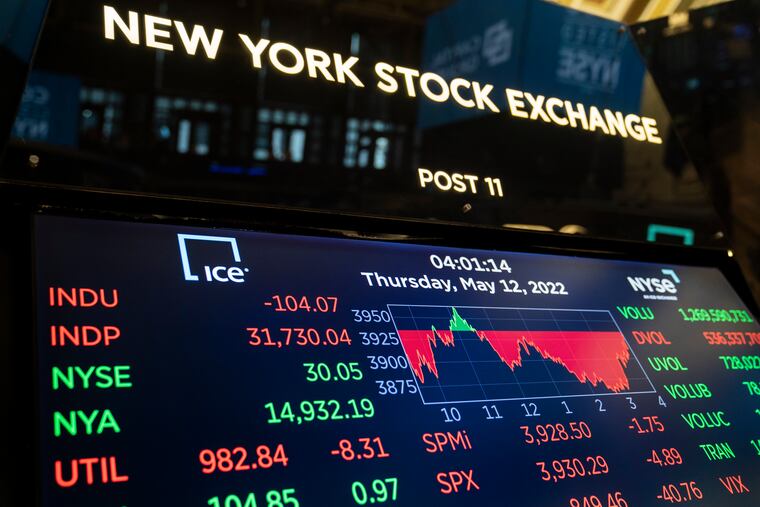We’re probably in a recession, even if Biden tries to deny it
If our economy is bad — and it is, by any number of measures — the people in office should be focused on fixing that, not convincing us that it isn’t so.

As of Thursday, the American economy appears to be in an official recession — another word for a prolonged downturn in the economy, often associated with fewer jobs and profits. But even before the news came down, the Biden administration was asking the public to cast some serious doubt on the word “official.”
We should doubt the administration instead.
Plenty of things are called “official” that are actually up for debate. We are told that March 21 is the official first day of spring, but meteorologists mark the start of that season on March 1. I personally think spring begins when the first game of the NCAA March Madness tournament tips off. But to each his own — spring, as a season, existed long before humanity itself. It’s open to interpretation.
Other things, like recessions, begin with definitions. It’s a relatively new word. People used to speak of “panics” and “depressions,” but after the devastating effects of the Great Depression in the 1930s, subsequent lesser downturns in the economy hardly felt worthy of the name. It became generally accepted that two or more consecutive quarters of a falling gross domestic product would signify a recession.
Joe Biden knows this. When the United States tipped briefly into a recession at the beginning of the COVID-19 pandemic, he was quick to call it that — and to blame Donald Trump. “I helped pull this country out of a recession before,” he tweeted on Oct. 11, 2020, “and, as president, I’ll do it again.” Four days later, he said, “President [Barack] Obama and I left Donald Trump a booming economy — and he caused a recession. He squandered it just like he has everything else he’s inherited in his life.”
By that time, the economy was growing again. But Biden never let the truth get in the way of scoring a political point.
» READ MORE: How to recession-proof your life amid economic uncertainty
Now, though, the shoe is on the other foot, and the White House is hedging its language.
“What is a recession?” asked a recent, unsigned blog post on the White House website. “While some maintain that two consecutive quarters of falling real GDP constitute a recession, that is neither the official definition nor the way economists evaluate the state of the business cycle.”
Even the dictionary is getting in on the act. Look up recession on Merriam-Webster’s website and you will find no mention of the “two consecutive quarters” language. But back in 2020, it was listed there as the financial definition of the word, as archived versions of the site show.
Like most politicians, Biden has never shown a great affinity for the truth. His 1988 presidential campaign went down in flames after it was revealed that he plagiarized stretches of his own life story from a speech given by British Labour politician Neil Kinnock, one of multiple fabrications in which he was caught during his first run for the presidency. The mortification of being caught in so many lies would have ended a more scrupulous man’s career. But he persisted, all the way to the White House.
“The first step to a solution to our economic woes is admitting that they exist.”
Biden was helped there by his 2020 opponent, Trump. Biden had the good fortune to run against a man who is widely known to lie about equally pointless and easily fact-checked things. After Trump, Biden’s fabrications look like run-of-the-mill fibs, the kind we’ve come to expect of every candidate for high office.
Is it any wonder we don’t trust our government?
The whole field of politics has become focused on spin, not action. If our economy is bad — and it is, by any number of measures — the people in office should be focused on fixing that, not convincing us that it isn’t so.
Not every economic downturn is a president’s fault, just as not every strong economy is a testament to his great leadership. The president is not all-powerful. But he oversees part of the government, and in hard times people look to him for answers. Economic downturns like the current recession are serious matters. Lessened demand for goods will make companies lose money, throwing people out of work. Combined with an inflation rate that has eaten up all of our wage gains and then some, it is clear that people are hurting.
The first step to a solution to our economic woes is admitting that they exist. Biden and his people seem unwilling to do this, but there’s really no point in denying it: no one believes them anyway. People know it’s bad. They feel the inflation every time they go to the supermarket or the gas station.
In an age accustomed to spin, lies, and the denial of objective truth, people are desperate for reality, even when it is unpleasant. They didn’t get it from Trump, and they aren’t getting it from Biden. A president who is grown-up enough to admit the truth would go a long way in restoring the American people’s faith in the system.
Kyle Sammin is editor-at-large at Broad + Liberty.